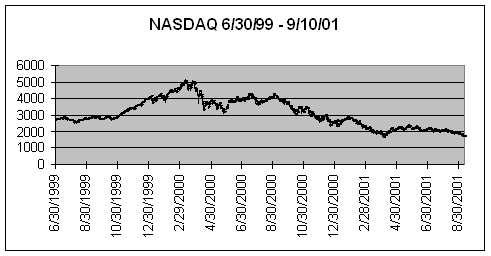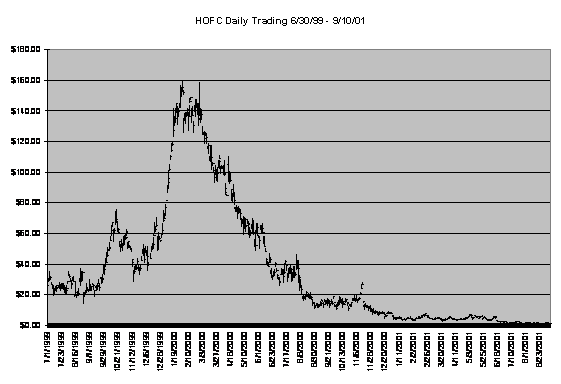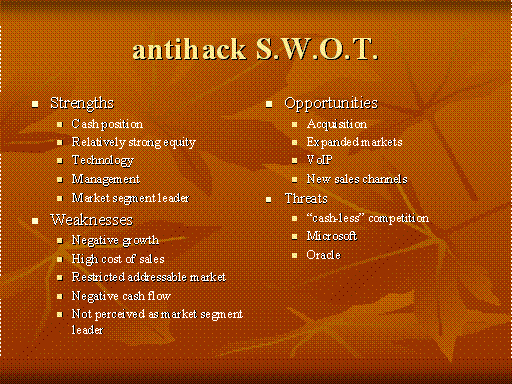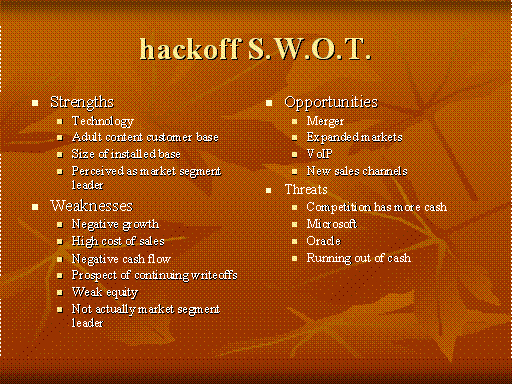At 9:05 AM, just as President George W. Bush is preparing to read with the children, advisor Andrew Card whispers to him: “A second plane hit the second tower. America is under attack.” The President hears the pagers and cell phones of the press around him start to erupt. He remains calmly with the children for another seven minutes.
Although the Secret Service wants to move him away from this scheduled place where attackers might have known he would be, the President insists on speaking to the country for a few minutes from the school before leaving for the airport. No one with the President or at the White House knows yet that even more planes have been hijacked.
On the way to the airport the President hears that the Pentagon, too, has been hit. At 9:45 he is on the phone with the Vice President: “Sounds like we have a minor war going on here, I heard about the Pentagon. We’re at war … somebody’s going to pay.”
The President wants to fly directly back to Washington. The Secret Service don’t want him to. The Vice President doesn’t think he should. They are still arguing when Air Force One takes off. Its only mission for the moment is to get the President as high into the relative safety of the air as fast as it can.
#
By 9:59 much of the world is watching live as black smoke billows from the Twin Towers. CNN plays the loop of the plane hitting the south tower over and over again. Commentators are already speculating on the cost and time required to rebuild the World Trade Center.
Suddenly a bulge appears in the middle of the south tower and smoke and debris erupt from the bulge. Before most watchers realize what the bulge means, the south tower implodes. A cloud rises in its place and then settles quickly over lower Manhattan.
On the streets, evacuees are fleeing the area in all directions. Some stream on foot over the Brooklyn Bridge. Others trek uptown towards perceived safety. The lack of panic is eerie.
Dom Montain is part of the uptown-bound contingent just several blocks north of the towers when a huge wind pushes him forward and careens him into an elderly woman ahead of him who also falls.
“I’m sorry,” Dom starts to say. Then: “Roll under this truck with me. We’ll be safe.”
The woman’s eyes are wide with fear; her almost toothless mouth in a silent scream. But she does not resist as Dom rolls them both under an abandoned UPS van in time to avoid the shower of debris, some of it flaming, that now falls all around their sheltering truck. It is black; utter black. They cough and their eyes tear but see nothing in the blackness.
“Mein kinder; mein kinder,” wails the old woman and holds herself closer to Dom.
“I’m-not-afraid,” says Dom in his mechanical voice, then in his normal voice: “I’m really not afraid. You’re okay; we’ll be okay. It’s just the wind and the dust from a tower collapsing.”
The blackness lightens; the streets, as they come back in view, are covered with ash. Dom has to push drifts of ash away to get them out from under the truck. The air smells of fire; of burnt rubber; of flaming kerosene; of shorted electric lines; and of incinerated flesh.
Ash-covered people appear in the clearing air. Most are dazed; some bloody from having been knocked over; some burnt by hot debris. An ashen EMS squad emerges from the dust and immediately and almost silently triages the wounded. They have one apparent heart attack to deal with and a young woman gives the victim mouth-to-mouth respiration with a protective shield until their portable defibrillator is ready for use. It shocks him safely back to life.
A very fat male EMS technician with a Santa Claus beard and face takes the old woman from Dom who is propping her up and calms her in Yiddish. “She says you are a mensch,” he says to Dom.
“I am Ultra…” Dom begins. “I’m glad to have been able to help.”
The trek north continues; still no panic but more urgency now as people shout to each other that the other tower will collapse as well.
Back at the site, rescue workers in the north tower are ordered by radio to evacuate. Most of them don’t. Some are too intent on their mission to obey. Others simply never heard the order because their radios aren’t working.
At 10:28:31 the north tower collapses and spawns another great cloud of debris. As it comes down, it destroys the Marriott Hotel next door in the World Trade Center complex.
#
It is now mid-afternnoon of September 11, 2001. The President has flown first to Barksdale Air Force Base in Shreveport, Louisiana where he says: “Freedom itself has been attacked and freedom will be protected.” Then he is taken to a SAC bunker in Nebraska.
An ABC correspondent tells anchor Peter Jennings: “Peter, the President has gone down the rabbit hole.”
Jennings goes on to complain about the President’s apparently random wanderings and describes how he is “being taken” here and there.
The President orders his plane to take him back to Washington.
#
Mid-afternoon at The Stuart School in Princeton, New Jersey is the time the parents come for the children. Stuart School is run by Sister Fran and is so good that many Jewish parents send their girls to this Catholic school for the values it teaches. There is talk of starting a boys’ version of the school.
Sister Fran and the teachers know that many of the parents work in New York City. Some of them, usually brokers, go in very early and come back in time to pick their children up. They are afraid that there will be some children that no one picks up.
They don’t want to explain the whole horror to the children — they hardly understand it themselves. They know they won’t be able to answer each girl’s first question about her own parents. But they don’t want to lie to the children, either. So, they tell the children there has been an accident and there is a massive traffic jam coming out of New York. Some parents may be late, some very late.
Somehow, though, information begins to leak into the school The children invent their own story from the random words they hear: There has been a stock market crash, they decide, as the word “crash” reaches them. It is very bad because their parents may have lost lots of money. Some wonder out loud if their parents will still be able to afford Stuart.
Sister Fran and her staff intend to stay until every girl is safely with someone to care for her. They begin calling parents to see who is home and to gather volunteers to take neighbor children home if no parent arrives. Many of the parents they can reach organize themselves into a voluntary phone chain to locate other parents and other volunteers. Sister Fran asks them not to pick up their own children early so that those with no located parents won’t be left isolated any longer than necessary. She has so many offers of volunteers to help at the school that she has to ask them not to come until she calls them. By 3:00 PM, they have located a parent or a willing surrogate for every girl.
#
New York Mayor Rudy Giuliani is asked his estimate of the number of World Trade Center casualties.
“More than any of us can bear,” he says. He has already ordered an evacuation of lower Manhattan. The tunnels and bridges that connect Manhattan to the mainland and Long Island have been made one way except for a few inbound lanes reserved for emergency traffic.
The only people at the World Trade Center site now are policemen and firemen, many of them near shock and frustrated by not being able to approach the still burning stubs of the towers, which they hope beyond hope contain survivors. They all know people who ran into the towers in the morning and have not seen most of them since.
On the New Jersey side of the Hudson River a huge volunteer force of doctors, medical technicians, and construction workers has gathered. They are ready to receive the wounded. There is a fleet of ambulances. Fresh blood is in refrigerated transport from surrounding states. Long lines of volunteers grow outside blood donation centers. Some calls to the Red Cross are from those desperately looking for missing relatives; most are from those looking for some way to help; something to do; some way to be active in dealing with the overwhelming horror.
Under arc lights, they build field hospitals on the New Jersey docks to prepare for the wounded. No wounded ever come. The few who are injured but still alive are treated in New York. But most of the physically wounded are dead. The medical people on the dock cannot believe that. They will wait until morning for someone to save. The giant cranes are mobilized overnight. The construction workers and firemen tear the rubble apart with their bare hands in a search for survivors who are never found. Steam mixes with the smoke and swirls from the raw gap in the New York skyline as exhausted and grief-stricken firemen pour water on a fire that smolders seemingly to the depths of Hell.
#
It is evening now. Larry and Louise Lazard are on the deck of their home in Atlantic Highlands, New Jersey. Their view over New York harbor includes the black smoke and white steam from the World Trade Center site. The top of the plume is lit by the setting sun while the base is fading into the dusk. The other towers of Manhattan are silhouetted against the murky sunset and occasionally disappear as they are wrapped in downdrafts of smoke.
“Larry, what’s the matter?” asks Louise.
“Now that’s dumb fucking question. I was just in a building that got hit by a bunch of terrorists with a plane that might as well have been a bomb. I saw people jumping out of windows. I just barely got my ass out of there in one piece. I spend half the day trying to get off that fucking island and get home. And you ask me ‘what’s the matter?’”
“Larry, don’t bullshit me,” says Louise. “I’ve been with you a long time. It’s like when you got out of jail. There’s something you’re not telling me. All day I was afraid you were dead and somehow I knew you weren’t, too ... I waited. I watched TV. That was no picnic either. And now you’re back and I should be very happy — I am ecstatic you’re not in that hell — but it’s like you’re not back, too. Why? What aren’t you telling me?”
“I’m telling you. I can’t tell you what it’s like to be there. Worst place I’ve ever been.”
“Do you think we should try to call Dom again?” Louise asks. “I’m so worried about him.”
“He’ll call when he can,” says Larry. “I told you I saw him on the way out. He’ll check his voice mail when he can — you know Dom — and then he’ll call. But the phone networks are still pretty much down in lower Manhattan. Verizon had a big switch under the World Trade Center and that’s gone. Power is still off to a lot of places down there, CNN said.”
“But cell phones should work,” Louise objects. “They have their own batteries.”
“They have to talk to towers. One: the towers need electricity. They have batteries but those’ll only last so long. Two: everyone and their brother is trying to get through, so the cell switches have to be congested too. Three: those calls go through the regular switches, which are broken or jammed on the way to the cell network. So don’t count on that. Dom’s alright; he just can’t get through to tell us.”
“How do you know he’s alright? How do you know? Tell me again how you got separated.”
“This isn’t a bedtime story, you know,” says Larry. “Nothing is ever going to be the same again.”
“There’s something you’re not telling me about Dom. Did he panic? Did his claustrophobia get him? It must have been awful in that stairwell.”
“Yeah, he was very strange. Everyone was scared but he froze. There was some guy collapsed in the stairs, some guy with real thin legs and braces, probably had AIDS. He was blocking the stairs. And Dom froze when he got there.”
“What did you do?”
“I told him to push the guy the fuck out of the way and get down.”
“Maybe Dom wanted to help him.”
“Maybe he did and maybe he just froze, but it was the wrong thing to do. Saving one life — or trying to save one life — just doesn’t make any sense if it’s going to make hundreds more people die. You don’t know what it was like in that stairwell. It’s blocked and people maybe get crushed or just don’t get out before the building comes down. So it’s the wrong time to get hung up on this one guy with AIDS who isn’t gonna live all that long anyway.”
“Is that what’s bothering you? Are you bothered because you didn’t want to help the guy and Dom did?”
“No … Yes … I don’t know. It was the easy thing to do to ‘help’ him but it was wrong. There were more people to think about.”
“Spoken like a true CEO,” says Louise.
“Yeah. Well sometimes it isn’t easy making decisions. That’s what CEOs do. That’s what I fucking do. And people don’t like it, too fucking bad. You don’t like it, fuck you, too,”
“Larry, you know goddamn well I love you. Sometimes I wouldn’t do what you do; that’s all. And I’m not a CEO, either. It’s okay. I’m just worried about Dom and sick from worrying about you all day. How could anyone do that?”
“Do what?”
“Hijack those planes and fly them into the buildings and kill all those people. How could they do that? How could they hate so much?”
“They keep them in those camps,” says Larry. “You know. They keep them in those camps. They grow up in those camps and they’re full of hate and they do what they’re told.”
“CNN said they think some of them are Saudis, not Palestinians. Saudis don’t grow up in refugee camps. Osama bin Laden’s Saudi, too, and they think he may be behind it.”
“Yeah, well most Saudi men have no chance of getting laid. They grow up in this corrupt kingdom where a quarter of the people are princes and if you’re not a prince you’re screwed. The princes get four wives each and there are no women left over for anyone else. No wonder they’re screwed up. That’s probably why they have to bundle all the women up so no one can see them. Otherwise those guys go crazy. Then they get told that if they kill infidels they go to Muslim heaven and there are a bunch of virgins waiting for them — they’ll do anything. So maybe that’s it.”
“Osama bin Laden has four wives,” says Louise. “He shouldn’t be too horny but he still hates us. If he did this, he really hates us. I don’t know. I just know you’re alive and that’s wonderful and I’m still worried sick about Dom. And I know there’ll be other people we know who were there too. I want to do something.”
The phone rings and Louise goes to answer it. She is smiling when she comes back. “It was Dom. He’s okay. He called from his apartment. He’s supposed to evacuate but he isn’t gonna, he says.”
“How did he get his phone to work? CNN said no phones are working in lower Manhattan?”
“I don’t know. You know Dom. Some Internet thing. A phone in his computer or something. I think he said ‘Free World’ something. I’m just glad he’s okay. He sounded strange, though.”
“You think everybody sounds strange. We are strange. We’ve been in a fucking disaster.”
“No, Lar, he sounds strange differently than you sound strange. You’re strange sad and he’s almost — I don’t know — strange HAPPY.”
“Happy? That’s not strange. He’s happy to be alive. I’M happy to be alive. But I’m sad, too, and I’m pissed.”
“He didn’t want talk to you. That’s strange, too. He knew you were okay because you left him voice mail and he said it looked like you were getting out okay. But he said something strange, something like he didn’t ‘need’ to talk to you. What do you suppose that means?”
“I don’t suppose it means anything. He doesn’t need to talk to me; he’s right. Maybe he’s starting to grow up. Maybe he’s just tired.”
“He said he got that guy he was helping down to where EMS was.”
“Good for him,” says Larry. “But it was still the wrong thing to do. More people might’ve died, maybe more people did die, because they slowed things down, blocked the stairs. And if EMS was working on him in that building when it collapsed, he’s dead anyway and so are they.”
“He said something else strange, too…”
“You talked a lot. You were only gone a coupla minutes.”
“Yeah, well, at least someone tells me what he feels. It’s not like I’ve got to drag it out of him. He wanted to talk.”
“You’re his den mother. What else did he say that was strange?”
“He said he wasn’t afraid.”
“He was, I saw him, he could hardly get through the door into the stairwell he was so scared. I think I had to push him in.”
“Yeah, he said he was scared at first. Then he just wasn’t scared. Like getting scared got scared out of him, I think he said. Something weird.”
“Yeah, well, good for him. I was scared, too. Glad he got out. I think Bush is about to say something.”
They go back inside.
While they wait for the President to appear, Larry says: “This doesn’t sound good: they ‘took’ the President here; they ‘took’ the President there. Leaders don’t get ‘took’; leaders lead.”
8:30 P.M. EDT
THE PRESIDENT: Good evening. Today, our fellow citizens, our way of life, our very freedom came under attack in a series of deliberate and deadly terrorist acts. The victims were in airplanes, or in their offices; secretaries, businessmen and women, military and federal workers; moms and dads, friends and neighbors. Thousands of lives were suddenly ended by evil, despicable acts of terror.
The pictures of airplanes flying into buildings, fires burning, huge structures collapsing, have filled us with disbelief, terrible sadness, and a quiet, unyielding anger. These acts of mass murder were intended to frighten our nation into chaos and retreat. But they have failed; our country is strong.
A great people has been moved to defend a great nation. Terrorist attacks can shake the foundations of our biggest buildings, but they cannot touch the foundation of America. These acts shattered steel, but they cannot dent the steel of American resolve.
America was targeted for attack because we're the brightest beacon for freedom and opportunity in the world. And no one will keep that light from shining.
Today, our nation saw evil, the very worst of human nature. And we responded with the best of America — with the daring of our rescue workers, with the caring for strangers and neighbors who came to give blood and help in any way they could.
Immediately following the first attack, I implemented our government's emergency response plans. Our military is powerful, and it's prepared. Our emergency teams are working in New York City and Washington, D.C. to help with local rescue efforts.
Our first priority is to get help to those who have been injured, and to take every precaution to protect our citizens at home and around the world from further attacks.
The functions of our government continue without interruption. Federal agencies in Washington which had to be evacuated today are reopening for essential personnel tonight, and will be open for business tomorrow. Our financial institutions remain strong, and the American economy will be open for business, as well.
The search is underway for those who are behind these evil acts. I've directed the full resources of our intelligence and law enforcement communities to find those responsible and to bring them to justice. We will make no distinction between the terrorists who committed these acts and those who harbor them.
#
“That’s it,” Larry says. “That’s what’s important. ‘And those who harbor them’ I hope he means it. Carter…”
“Shh,” says Louise.
#
THE PRESIDENT: I appreciate so very much the members of Congress who have joined me in strongly condemning these attacks. And on behalf of the American people, I thank the many world leaders who have called to offer their condolences and assistance.
America and our friends and allies join with all those who want peace and security in the world, and we stand together to win the war against terrorism. Tonight, I ask for your prayers for all those who grieve, for the children whose worlds have been shattered, for all whose sense of safety and security has been threatened. And I pray they will be comforted by a power greater than any of us, spoken through the ages in Psalm 23: "Even though I walk through the valley of the shadow of death, I fear no evil, for You are with me."
This is a day when all Americans from every walk of life unite in our resolve for justice and peace. America has stood down enemies before, and we will do so this time. None of us will ever forget this day. Yet, we go forward to defend freedom and all that is good and just in our world.
Thank you. Good night, and God bless America.
END 8:35 P.M. EDT
#
“‘And those who harbor them,’” quotes Larry again. “That’s what’s important. That’s what we’ve really got to do. They, the terrorist kids, have nothing to lose or they’ve been told they have nothing to lose. But somebody sent them and that’s where we’ve got to go. Not just lob a few missiles at them, not a Bill Clinton war without inhaling. We have to go after ‘those who harbor them.’”
“My father would’ve agreed,” says Louise. “But who are they? Who do we go after?”
“Saddam Hussein; Osama bin Laden; maybe Yasser Arafat, but he’s too easy, we just have to unleash the Israelis. Maybe the Saudi royal family. Almost doesn’t matter, but it can’t be a free shot to hit the US like this. I hope Bush can do it. I wouldn’t want to be in Baghdad or Kabul tonight.”
“But we can’t just go and bomb a lot of innocent people in those cities,” Louise objects.
“A lot of innocent people in our city just got ‘bombed’,” says Larry. “Look, innocent people will die as we make ‘those who harbor them’ pay. It’s not fair, but we can’t let this stand. And those ‘innocent’ people also have to not tolerate leaders who are going to bring the wrath of the US down on them. But there has to be a real ‘wrath of the US’, not just bullshit.”
“Lar, I don’t know. I know you’re okay; Donna’s okay; Dom’s okay; a couple of other people I checked up on so-far-so-good, thank God. And I know we’re gonna find some friends aren’t okay and friends of friends’ll be dead for no reason. And all those brave firemen and cops who ran INTO the building. You know they have young—”
“Are you saying I was a coward to run OUT of the building?” Larry growls.
“No, Larry... Is that what’s worrying you? No! No! You were supposed to come back to me. You did what you—”
“The only thing worrying me is you worrying about what’s worrying me. LEAVE ME ALONE!” He pours himself a drink, goes into his home office, and slams the door.
“Nothing will ever be the same,” Louise tells her mother on the phone.
Nothing will ever be the same.
#
It is late on the night of September 11, 2001. George Harcourt’s BMW 750iL looks dusty as it sits nearly alone in the huge parking lot at Princeton Junction. Here and there are a scattering of other cars whose owners will never return for them. The scene is similar at all the commuter parking lots on all the New Jersey Transit and Metropolitan Transit lines that lead to the wounded city.
The would-be rescuers are still on the Hudson River docks waiting for treatable casualties that will never come. Some curse and some cry and some joke because they have to. There won’t even be many bodies.
The victims are ashes in the still hellish holes.
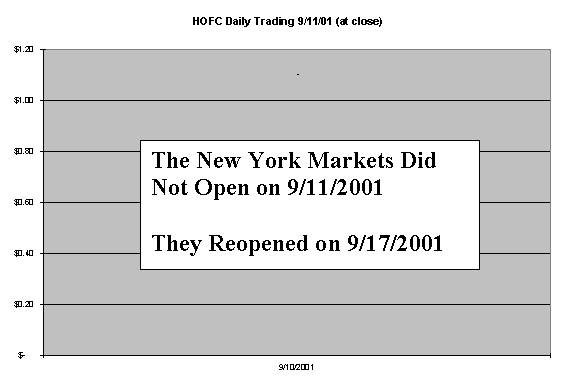
coming back later, set blookmark here
| display next episode now »
